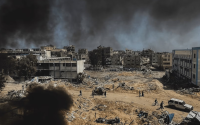Published on Thursday, December 12, 2002 by the International Herald TribuneCommon Dreams16 December 2002
PARIS -- In the months following the terrorist attacks of September 2001, it was politically taboo to say that the United States had in some way brought these attacks upon itself. Television talk show hosts and print journalists lost their jobs for suggesting such a thing.
Yet anyone with any serious knowledge of the American relationship in recent years with the Muslim Middle East knows that it is true, even if it is only part of the truth.
The Israel-Palestine conflict is a self-evident source of the alienation of Arab Muslims from the United States since 1948, and particularly since 1967, when Israel occupied East Jerusalem and the West Bank.
The essential cause for conflict, however, is one that commentators are trying to get at when they talk about the "crisis of modernization" in the Islamic world. It is the incompatibility of values between Islamic society and the modern West. The power and material dynamism of the West seem inseparable from a value system that demands that Muslims give up their moral identity.
The British conservative writer Roger Scruton asked in a recent book why we should blame Islam for trying to reject "western technology, western institutions, western conceptions of religious freedom" when all of these "involve a rejection of the idea on which Islam is founded - the idea of God's immutable will, revealed once and for all to his prophet, in the form of an unbreachable and unchanging code of law."
Why indeed? The West takes for granted that the existing religious assumptions of Islamic society have to be overturned, not only because they don't suit the West but because the West believes that they are unsuitable for the Muslims themselves.
There is constant Western pressure on Islamic governments to conform to Western conceptions of human rights and promote free and critical religious and political thought.
In short, they are to become us.
We in the West are inclined to think that everybody must eventually become like us. Standard American discussion of American destiny and the "end of history" takes for granted an eventual benevolent Americanization of global society. To the orthodox Muslim that means apostasy, immorality and God's condemnation. Westernization, to Westerners, means liberation. Americans do not conceive of themselves as inheritors of a Western legacy of Promethean violence. For people in other societies, Westernization frequently means destruction, social and moral crisis, with individuals cast adrift in a destructured and literally demoralized world.
Cultural and political disorientation, violent resistance to the intruder and attempts to recapture a lost golden age are natural reactions to this. We see all of this today.
The violence of the shock is intensified when the foreigner establishes military bases and tries to shape an Islamic country's policies. This has been Pentagon policy during the past decade, with regional commanders for all of the world's major geographical zones and expansion of the U.S. worldwide base system. The New York Times a few days ago wrote about the rising importance of ultraconservative or radical Islam in Saudi Arabia, and acknowledged that its growing influence has been directly connected to the presence of American troops in that country since 1990.
Originally the bases were temporary, needed for the U.S. campaign to drive the Iraqis out of Kuwait. It was a moment when the Saudis believed they needed protection from Iraq.
However, when the Gulf War was over the United States rashly pressed a reluctant Saudi monarchy to allow permanent American bases. The Sept. 11 attacks, carried out mainly by Saudis, avowedly were revenge for the "contamination" of the Islamic Holy Places by those bases.
Relations between Washington and the Saudi monarchy today are so strained that the United States will probably be denied use of the bases for an attack on Iraq.
Almost certainly this will be so if there is no United Nations mandate for the attack.
The United States now has extended its base in Kuwait to nearly a third of that state's territory. There are new bases in the other Gulf monarchies.
The Afghanistan intervention has left American bases in that country, and in Uzbekistan and Kazakhstan. The war against terror has expanded American troop presence in Georgia and the Muslim southern Philippines. A long military occupation of Iraq is envisioned by Washington.
Every base conveys the contamination of "infidel" modernization, as well as the oppressive suggestion of foreign military occupation.
Washington remorselessly expands its military presence in the Islamic world in order to fight the anti-American terrorism that its presence causes. No one in the government seems to see a contradiction in this.






